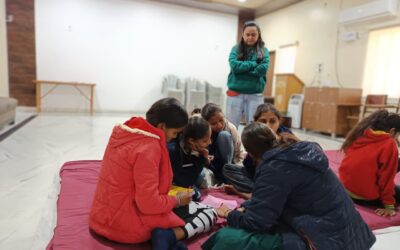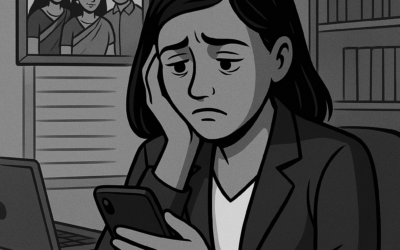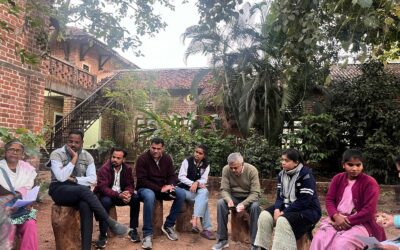Recently, I attended a human process lab, and as the name suggests, to me it felt like a laboratory for experimenting with human processes. Essentially, a large group of unknown people were divided into smaller subgroups, referred to as T groups. A few facilitators sat with each T group and asked the participants to share their feelings in the moment. These rooms served as the ‘labs’ for each T group, and several such labs were running simultaneously, created from the larger group.
The purpose of this process is to help participants become aware of the various micro-processes occurring within themselves.
The idea is to first recognise these processes on a personal level and then connect them to similar processes at a broader societal level. The underlying concept is that the dynamics occurring within individuals often mirror those found within society. Anyway, this was my understanding of the entire process and its intended training outcomes. One prominent theme that emerged across all T groups was the concept of “power” and its role in human relationships, whether between two individuals, within a group, or in society at large.
Complex Dynamics Of Power
Power, as I have come to realise, is an interesting and complex subject. Some individuals are born into power, some acquire it, some earn it, others fight for it, and still others crave it. While it is easy to assume that certain people are powerless and certain powerful, what I understood in that lab was that everyone possesses some form of power. It is the specific time, space, and situation that determine how effectively they can use it. In this sense, no one is truly powerless.
For instance, let’s consider Person A and Person B. If Person A is operating in Person B’s space, time, and situation, then Person B might appear more powerful in that context. Resonating the same concept with my current work during the fellowship where I am working with an NGO designing and implementing interventions related to gender equity within the communities we engage with.
Let’s say we, the NGO, are Person A, and the community we are working with is Person B. Based on this analogy, one might assume that the community (Person B) holds the power in this dynamic, as the interventions occur within the community’s space, time, and situation, right?
A Shift In Perspective
However, looking at it from another perspective, the NGO (Person A) must also hold some power to even enter and engage with the community. This power comes from the resources, knowledge, or authority that enables the NGO to make such interventions. So, who is truly more powerful?
While the community might appear powerful in its own space and situation, the NGO’s ability to influence and interact highlights its own unique form of power.
I am currently working with an NGO that focuses on building gender equity and fostering collective ownership among women in the work they do. Recently, an incident occurred within the community I am engaged with. The community consists of women striving to establish a collective stitching enterprise.
Silai, Schedule And An Email
One of the women from this community is managing one of our silai centres. For office-related expenses, she needs to obtain approvals from the accounts department. Sometimes, she requires my assistance, such as drafting emails or deciding on details like what name to put on a bill for the office. For one such task, she was seeking my guidance for a day or two.
However, due to my busy schedule and frequent travel, I was unable to assist her on the particular occasion. Initially, I felt I was delaying her work by not being available. But on the third day, I observed something remarkable. She independently managed to complete all the formalities to secure the necessary approval.
Despite not knowing how to write an email initially, she figured it out on her own and sent the email directly to the accounts department.
This experience left me reflecting on power dynamics. I thought that I had some power in terms of skills and capability over the community, which might have allowed me to enter their space and intervene. But at the same time as this space is of the women from the community, she doesn’t need any kind of dependence on anyone to get any work done. I felt powerless that day. Also, I questioned my position in that space. While my role might give me a certain sense of authority, her ability to act independently demonstrated her own power and agency.
Turning The Tables
In another role, I am currently pursuing a fellowship program where I am part of the community (Person B), while the people running the program are making interventions (Person A). Reflecting on my role here, I again ponder on the dynamics of power. As a part of the community, do I feel powerful? No, not always. I have a fear of abandonment from the fellowship team as I too feel dependent on them for most of things here.
But then again, am I powerless? No, not always. Because there have been instances in the program where I have used the benefit of my space, time and situation over them and realised my power a few times. This leads me to ask: who is truly more powerful, and how should we understand power?
Power seems to be distributed in complex ways. Those running the program have certain rights and authority, but as participants, we also hold some degree of power and autonomy.
Power Is Freedom
For me, power is closely tied to freedom. If I have the freedom to act independently, I feel powerful. Freedom allows me to learn, adapt, and accomplish things on my own, even if I don’t initially know how to do them. However, freedom itself is subjective. What constitutes freedom for one person might not resonate as freedom for someone else. This narrative can go on and on. But what should be discussed more is realised power and unrealised power. When one realises the power they have, they can execute it in the required manner.
Ultimately, power is not just about authority or control but also about empowerment—of oneself and others. Recognising and nurturing this shared power can pave the way for more equitable and collaborative relationships, both individually and collectively.





0 Comments